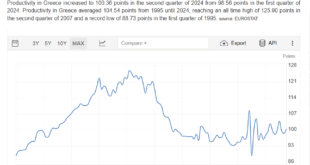Who decides what statistical offices measure and how they measure it? And what are the implicit values embedded in these decisions? Recently, the ILO issued a new manual on measuring productivity. Below, I´ll discuss the questions posed. But for starters, it is essential to realize that economists measure monetary productivity, not physical productivity, which leads to problems with ever-changing prices. This will be part of the discussion. The ILO (International Labour Organization)...
Read More »In Greece, gross fixed investment still is at a pre-industrial level.
Executive summary: if investments are needed, do not reform. Invest. Investments are the reform. Angus Maddison (historical patterns of growth) and Jan Kregel (leading post-Keynesian economist) were the intellectually dominant forces during my economics study in Groningen around 1982. Let´s apply their frameworks to Greece. Growth, as we measure it, has many sources: increasing the productivity of existing activities (the mechanization of the potato harvest), shifting labour from...
Read More »´Fryslan boppe´. An in-depth inspirational analysis of work rewarded with the 2024 Riksbank prize in economic sciences.
Introduction< The 2024 Sveriges Riksbank Prize for Economic Sciences has been awarded to Daron Acemoglu, Simon Johnson and James Robinson for work on the influence of institutions on long-term economic progress and growth. Much has been written about this, for instance by ´Pseudoerasmus´ here and by Radford here. In this article, an ´in-depth´ analysis of a part of the work leading to the the prize, an analysis of the long-term impact of the Dissolution of the English monasteries...
Read More »In their plaintive call for a return to the office, CEOs reveal how little they are needed
My latest in The Guardian Announcements from major employers, including Amazon and Tabcorp, that workers will be required to return to the office five days a week have a familiar ring. There has been a steady flow of such directives. The Commonwealth Bank CEO, Matt Comyn, attracted a lot of attention with an announcement that workers would be required to attend the office for a minimum of 50% of the time, while the NSW public service was recently asked to return to the office at...
Read More »A tale of two halves
When the banks fell over, they knocked the stuffing out of the British economy. The UK’s productivity has been dismal ever since. Unemployment has fallen to historic lows and wages are rising, but productivity growth remains near zero. This “productivity puzzle,” as it is known, has had economists scratching their heads for best part of a decade.But UK productivity is a tale of two halves. Experimental statistics recently released by the Office for National Statistics (ONS) reveal widely...
Read More »A tale of two halves
When the banks fell over, they knocked the stuffing out of the British economy. The UK’s productivity has been dismal ever since. Unemployment has fallen to historic lows and wages are rising, but productivity growth remains near zero. This “productivity puzzle,” as it is known, has had economists scratching their heads for best part of a decade.But UK productivity is a tale of two halves. Experimental statistics recently released by the Office for National Statistics (ONS) reveal widely...
Read More »Productivity, Labor Complexity, and Wage Determination Procedures — Peter Cooper
This post concerns an implication of Marx’s treatment of productivity and labor complexity for the appropriateness of alternative processes of wage determination. For simplicity, it is assumed that all activity is productive in Marx’s sense (that is, productive of surplus value) and that conditions are competitive in the Marxian (and classical) sense that investment is free to flow in and out of sectors in search of the highest return. Introducing unproductive labor, including a substantial...
Read More »Bill Mitchell — Puzzle: Has real wages growth outstripped productivity growth or not? – Part 2
Continuation.Bill Mitchell – billy blogPuzzle: Has real wages growth outstripped productivity growth or not? – Part 2Bill Mitchell | Professor in Economics and Director of the Centre of Full Employment and Equity (CofFEE), at University of Newcastle, NSW, Australia
Read More »Bill Mitchell — Puzzle: Has real wages growth outstripped productivity growth or not? – Part 1
I am currently working through the entire Commissaire Maigret detective series written by Belgian author author Georges Simenon. I read a lot as I travel around and I have 74 (out of 75) Maigret novels to read. But don’t let that fool you, I am already becoming familiar with Maigret’s forensic way of thinking (-:. So for the next two blog posts we will be conducting a forensic examination of data to solve a puzzle that appears to be confusing people. This is the sort of puzzle that people...
Read More »Why targeting productivity is a bad idea
Last week I attended a workshop entitled "Enhancing the Bank of England Toolkit," hosted by the Progressive Economy Forum. Presented at the workshop, and underpinning most of the debate, was this report from GFC Economics and Clearpoint Advisers, which was written for the Labour Party and first issued last June. The report was widely criticised at the time, as one of its authors ruefully observed in the introduction to the presentation. Nonetheless, the authors presented it unamended.The...
Read More » Heterodox
Heterodox






